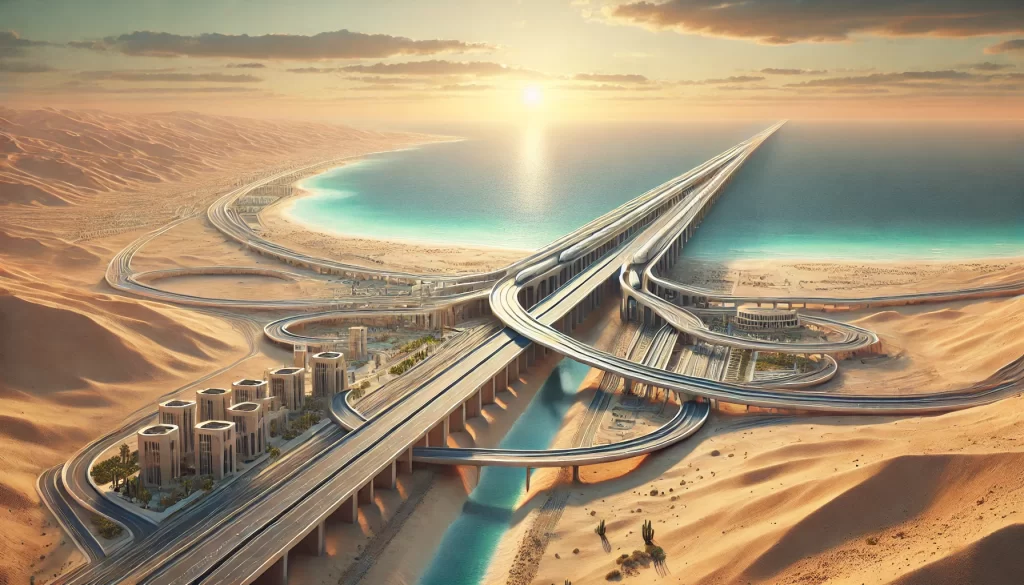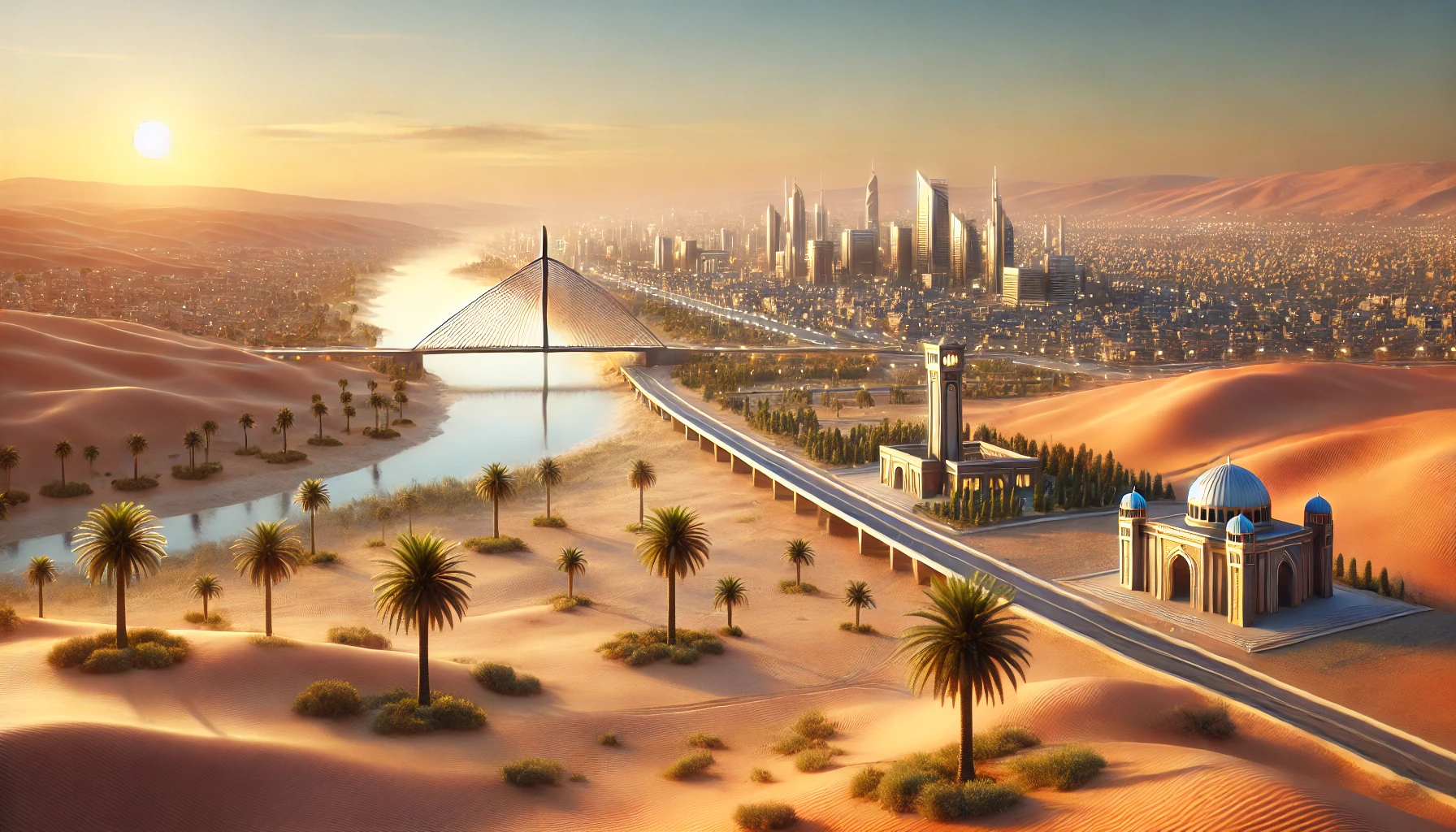From Desert to Destination: A Vision for Peace in the Middle East
In the heart of the Middle East, a longstanding conflict has persisted, rooted in issues of land, identity, and political history. This conflict, primarily between Palestinians and Israelis, has rippled across generations, affecting millions and destabilizing the region. While peace seems elusive, a new, transformative proposal emerges that envisions a Palestinian homeland in Egypt’s North Sinai. This plan not only addresses the humanitarian needs of the Palestinian people but also fosters unity, economic growth, and stability in the region. Here’s why this vision could be the key to achieving lasting peace.
Egypt’s Role as the “Motherland” of the Arab World
For centuries, Egypt has been seen as a leader in the Arab world. Its historical, cultural, and religious significance places it in a unique position to lead initiatives that benefit the wider Middle Eastern community. The proposed plan envisions Egypt generously providing land in North Sinai as a new Palestinian homeland. This act of solidarity goes beyond political strategy; it’s a gesture that honors Egypt’s legacy as a compassionate leader. By granting land to create a stable Palestinian state, Egypt would elevate its role as a unifier, setting an example of what true regional leadership looks like.
A Law of Return for Palestinian Refugees
One of the most pressing humanitarian crises of our time is the plight of Palestinian refugees scattered around the world, many of whom have faced decades of instability. A key feature of this proposal is the establishment of a “Law of Return,” giving Palestinian refugees the right to return to a safe and permanent homeland. This policy would allow millions of Palestinians to reconnect with their roots, rebuild their lives, and preserve their culture in a place they can call home. The implementation of this law would signal the world’s commitment to resolving a protracted crisis with dignity and respect, while finally granting Palestinians the stability they have long yearned for.
Recognizing Israel’s Heritage and Jewish History
For peace to be sustainable, it must be grounded in mutual respect and recognition. An essential component of this proposal is the acknowledgment of Israel’s historical and spiritual significance to the Jewish people. Islam, alongside Judaism and Christianity, holds deep ties to the land in Israel, particularly Jerusalem. By embracing these shared histories, the Middle Eastern community can promote tolerance and understanding across faiths. Such recognition doesn’t diminish Palestinian rights but rather paves the way for coexistence. Respect for Israel’s heritage, alongside the rights of Palestinians, aligns with Islamic principles that advocate for peace and justice, allowing both communities to honor their roots while moving forward.
Building Regional Economic Connectivity
An integral part of the proposal is the creation of a land bridge or infrastructure network connecting the Mediterranean Sea to the Red Sea, passing through Egypt and New Palestine in North Sinai. This overland route would create a second pathway, complementing the Suez Canal and establishing New Palestine as a vital hub in global trade. Through this bridge, New Palestine could serve as a key point for the flow of goods, energy, and people across Europe, Africa, and Asia, fostering economic interdependence and stability.
Moreover, this connectivity would have a transformative impact on the economies of New Palestine, Egypt, and neighboring nations, bringing in transit fees, jobs, and investment opportunities. Imagine a Middle East where trade flows freely across borders, enabling not just economic prosperity but also building interpersonal and interfaith connections that strengthen unity.
Tourism and Pilgrimage: A Path to Peace
Sinai’s geographical location near the Mediterranean coast makes it an ideal site for tourism and religious pilgrimage. The proposal suggests that New Palestine and the Sinai Peninsula could become a significant destination for Muslims worldwide embarking on their journey to Mecca for Hajj. With its convenient location, New Palestine could develop infrastructure to serve as a gateway, offering services and accommodations that would benefit both pilgrims and local residents.
Additionally, the pristine Mediterranean coast in New Palestine could attract tourists globally. From resort development to cultural experiences, this burgeoning tourism industry would create jobs, stimulate local economies, and foster international cultural exchange. This flow of visitors could enhance regional perceptions, transforming Sinai from a symbol of conflict into a beacon of peace and cooperation.
Embracing the Prophet’s Legacy of Tolerance and Diplomacy
The Prophet Muhammad’s life and teachings emphasize tolerance, justice, and the value of diplomacy, particularly in creating harmonious relationships with people of different faiths. The Constitution of Medina, one of the earliest documents advocating for peaceful coexistence among Muslims, Jews, and others, is a testament to the Prophet’s vision for a society rooted in equality and respect.
Following this example, the proposal advocates for a new approach to diplomacy in the Middle East. By embracing the teachings of the Prophet, the Islamic community can take steps to foster a Middle East where Jewish, Christian, and Muslim communities coexist peacefully. This effort to embrace tolerance reflects the Quran’s teachings and promotes a future built on cooperation and shared values.
Creating a Palestinian Homeland: A Balanced Solution for Stability
The heart of the proposal rests on the creation of New Palestine as a homeland for Palestinians. This vision doesn’t aim to erase history or conflict but instead to create a balanced approach that respects both Palestinian and Jewish histories. By establishing a Palestinian state that prioritizes the rights and identities of both communities, the plan offers a framework that honors both sides’ needs.
With secure borders and robust infrastructure, New Palestine would provide Palestinians the chance to build a thriving society. This foundation of stability would allow for a new chapter in Palestinian history where economic growth, cultural preservation, and political autonomy go hand-in-hand. Moreover, by acknowledging the Jewish historical connection to Israel, this vision encourages an approach that can lead to mutual respect and regional security.
Egypt’s Role in Restoring Regional Stability
Egypt’s leadership is critical in setting a precedent for peace and unity in the Arab world. By championing New Palestine, Egypt reinforces its values of solidarity, compassion, and respect for all people in the region. The project also aligns with Egypt’s historical role in promoting regional stability, demonstrating a proactive approach to fostering peace for its neighbors.
Supporting the establishment of New Palestine in North Sinai would not only provide a homeland for Palestinians but also strengthen Egypt’s legacy as a peace broker in the region. This vision sees Egypt as more than a political leader—it becomes a compassionate guardian of Arab unity and Islamic values, laying a foundation that benefits both Palestinians and Israelis.
Supporting the Palestinian “Law of Return”
Central to this initiative is the Law of Return, a provision ensuring that any Palestinian, regardless of where they currently reside, can return to this new homeland. This law provides a solution to a problem that has spanned generations, allowing displaced Palestinians a chance to reconnect with their heritage. This is more than a policy; it’s a moral obligation that speaks to Arab and Islamic values, providing refugees with a sense of belonging and national pride.
The establishment of a New Palestine that welcomes returning Palestinians is a testament to the region’s collective compassion and dedication to restoring dignity for its people. For Palestinians around the world, this law would offer a stable future, uniting families and communities within a sovereign homeland.
Economic Sustainability for the Future
Achieving peace is just one piece of the puzzle; sustaining it requires a strong, diversified economy. The proposal envisions New Palestine as a center of economic activity, offering job opportunities and fostering trade across the Middle East. Infrastructure projects, such as pipelines and transit routes, would make New Palestine an economic powerhouse that benefits the region’s financial stability.
Additionally, with investments from the Islamic world, New Palestine would have resources to develop healthcare, education, and essential services, improving the quality of life for its residents. Through these initiatives, the proposal creates a self-sustaining economy that supports Palestinian citizens and contributes to regional prosperity.

A Call for Global Unity
At its core, this proposal calls for unity among nations, faiths, and communities. It invites Muslims worldwide to contribute to this vision financially, spiritually, and politically. By supporting New Palestine, the Islamic community demonstrates that peace and cooperation are the ultimate goals of the global Ummah.
This vision isn’t solely about territorial adjustments—it’s about redefining relationships in the Middle East. It’s a reminder that peace is achievable when we value compassion, respect heritage, and honor shared responsibilities.
Conclusion: Toward a New Middle East
The From Desert to Destination proposal offers a bold but practical vision for peace in the Middle East. By fostering regional cooperation, economic development, and mutual respect, it lays the foundation for a Middle East where Palestinians and Israelis coexist in stability. Egypt’s role as a leader and the Islamic community’s support for the Law of Return and infrastructure projects demonstrate a commitment to a shared future.
This proposal isn’t just about addressing a political issue—it’s about creating a new reality where the Middle East transforms from a region of conflict into one of unity, prosperity, and peace. Let us rise to the challenge and make this vision of New Palestine a beacon of hope and resilience, turning dreams of peace into a sustainable reality for generations to come.



Comments are closed